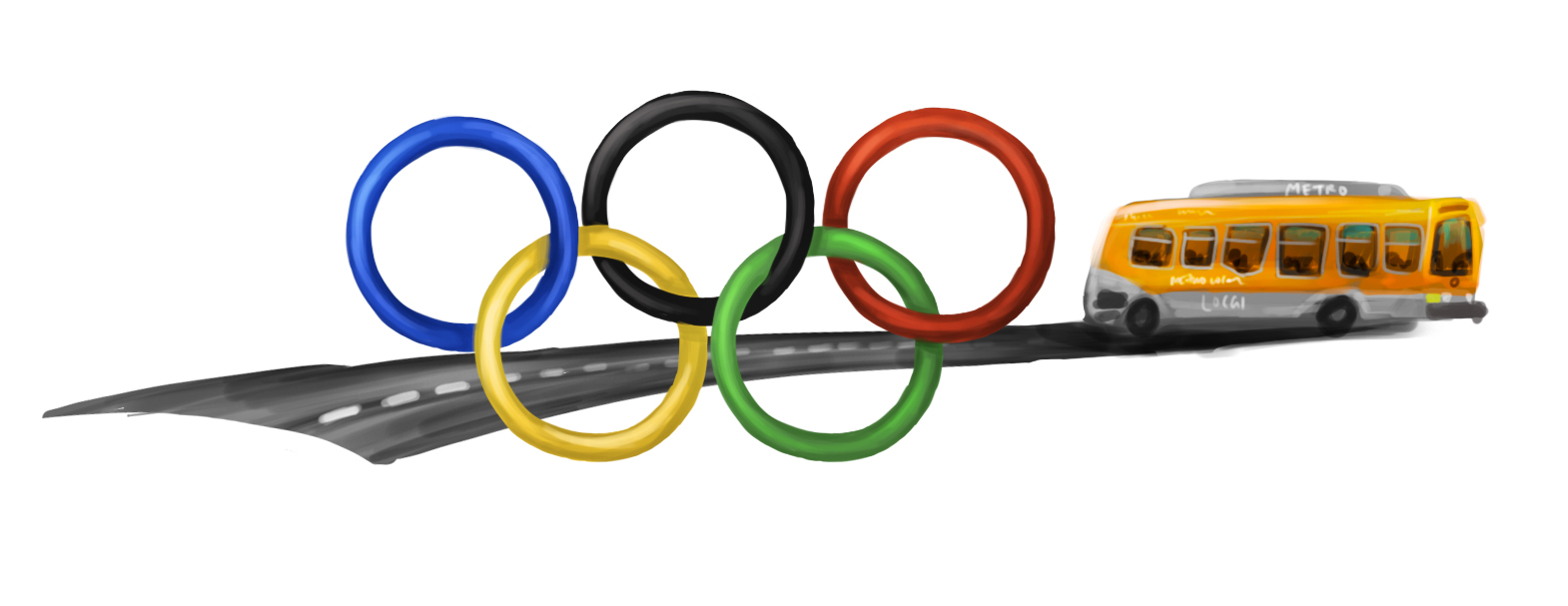Chris Campbell: Olympic bid must drive LA to a greater investment in public transit

(Kelly Brennan/Daily Bruin senior staff)
By Chris Campbell
Feb. 2, 2016 7:36 a.m.
In 1984, Los Angeles was facing threats of smog, hair metal and potentially the biggest traffic disaster in its history.
City officials were gearing up to host the 1984 Summer Olympics. The city had gone without serious public transportation for over 20 years and had grown (in)famous as the epicenter of American car culture. But now, naysayers were predicting that the Olympian games would bring similarly Olympian gridlock on the city’s web of freeways, making life unbearable for the average commuter.
Fortunately that antedated Carpocalypse failed to materialize and the City of Angels went on to host the most financially successful Olympics since 1932, when it was also in LA.
Flash forward to the present day – and LA is back at it. The city is submitting another bid, this time to host the 2024 Summer Olympic games and repeat its previous Olympic successes. But once again the threat of unabated gridlock looms large as spectators will attempt to shuttle between facilities at several different spots throughout Los Angeles. And it won’t be minor – almost 850,000 attended the 2012 Games in London.
LA can’t count on another 1984 scenario. In a September interview with the Bruin, former city councilman Zev Yaroslavsky attributed the 1984 traffic miracle to commuter anxiety. “People were so scared and frightened about what the traffic congestion might be that they stayed out of their cars during that period of time,” he said.
Garcetti needs to improve transit options, and fast. More specifically, he needs to focus on improving bus service as a more feasible and less costly alternative to rail expansion. After all, for $31.5 million the city can create a new bus lane in about a year, while the proposed Purple Line Subway expansion will take about 10 years and $100 million to complete.
Adding dedicated bus lanes will go a long way toward solving two of the principal problems with LA bus service, and the reason why many people opt to drive themselves: slow service and unreliable schedules. After all, people aren’t too inclined to use transportation that will pick them up 10 minutes late and make them miss their transit connection.
The plan still faces blowback from some residents – including the Westwood Neighborhood Council. They argue that adding dedicated lanes for buses and bikes will only make traffic congestion worse.
But it’s worked in the past. Yaroslavsky recalled the bus-only lane installed on Wilshire Boulevard in 2010. Despite facing much of the same criticism from community leaders, the bus lane proved to be massively successful. Ridership is projected to increase by 15% to 20%. What’s more, the traffic congestion the chorus of naysayers anticipated failed to materialize. “It didn’t prove to be the disaster everyone said it would be,” Yaroslavsky said.
In fact, he supports more projects like it. “They definitely didn’t go for the low-hanging fruit there,” he said. “Projects like this are the mark of a dynamic city.”
Making bus service faster and more prompt will encourage people to ride it instead of spending their commute stuck behind a steering wheel. And since the bus system is relatively cheap and easy to expand and maintain, this is the best option for expanding public transit access and encouraging people to ditch their cars for the morning commute.
It doesn’t need to be advertised that LA already has a traffic problem. Like most other big cities, there are a lot of factors contributing to the city’s traffic woes, but the problem can be boiled down to this: too many people, driving too far, toward too many different places.
Since 1984, the city’s population has grown by nearly a million people. Garcetti can’t count on nearly 4 million citizens simply staying home for two weeks, especially in a city that’s only seen growth in international prominence, urban density and traffic.
But the Olympics would provide a unique opportunity for Los Angeles – two weeks on the international stage to show the world that LA isn’t just a giant parking lot. Two weeks of nonstop TV broadcasts watched by hundreds of millions of people around the world.
So a few more bus lanes won’t hurt.
It worked for 2016 Olympics host Rio de Janeiro. And that city has even worse traffic than LA – third worst in the world, to be exact. It’s used its Olympics bid as an opportunity to invest heavily in bus transit and a new subway line. And now, city officials are urging Olympic spectators to ride public transit to events.
LA has been on the right track – no pun intended – in recent decades. It now has 200 different bus lines, six rail lines and a commuter rail system that stretches all the way to Oceanside and the Inland Empire. It’s even constructing an extension to the Purple Subway Line, which is expected to reach the Veteran’s Hospital in time for the Olympics. But that’s nowhere near enough to avert the impending 2024 traffic doomsday.
It’s all part of a larger effort. Between programs like Great Streets, Complete Streets, People St and a bunch of other streets I’m probably missing, Los Angeles is trying to kick its automobile habit by revolutionizing its streetscape. The idea is that more walkable and transit-friendly neighborhoods will encourage residents to embrace a car-free lifestyle.
Improving public transit will improve LA traffic, simple as that. And hosting the Olympics could be the jolt the city needs to make serious investments in it.
And maybe, if it receives the Olympic nod, Los Angeles can look forward to a gold medal in the 2024 Game’s most important event: just showing up on time.

